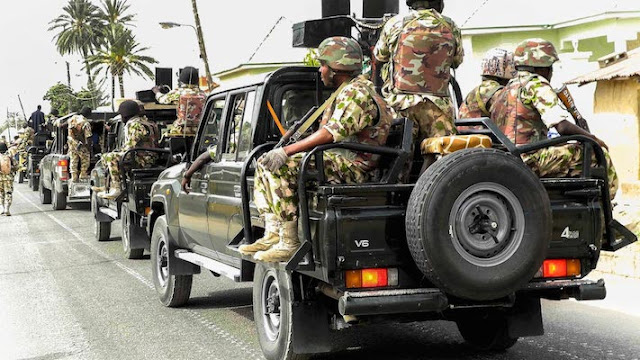In a significant move to address the persistent security challenges in Plateau State and its surrounding regions, the Nigerian Defence Headquarters has announced the rebranding of its long-standing Operation Safe Haven (OPSH) to “Operation Ensuring Peace.” The announcement was made by the Chief of Defence Staff (CDS), General Christopher Musa, during a formal event held in Jos on Friday, August 29, 2025. This strategic transition reflects the military’s renewed commitment to tackling insecurity with a more comprehensive, collaborative, and sustainable approach. The rebranding is not merely cosmetic but signifies a shift in operational strategy, aimed at fostering lasting peace in an area that has been plagued by communal conflicts, armed banditry, and other forms of violence for decades.
A Historical Context of Operation Safe Haven
To fully appreciate the significance of this rebranding, it is essential to understand the historical evolution of the operation. In 2010, the Nigerian military established a Special Task Force (STF) in response to escalating security challenges in Plateau State and its environs. The region had become a hotbed of communal clashes, ethno-religious conflicts, and other forms of criminality that threatened the stability of the area. The STF was tasked with restoring order and ensuring the safety of residents in Plateau State, which had witnessed recurrent violence resulting in significant loss of lives and property.
In 2015, the STF underwent a transformation and was renamed Operation Safe Haven (OPSH). This rebranding came with an expanded mandate, extending its operational reach beyond Plateau State to include parts of Bauchi and Kaduna states. The expanded scope was designed to address the interconnected nature of security challenges in the region, where conflicts often spilled across state boundaries. Over the years, OPSH has played a critical role in mitigating communal conflicts, curbing armed banditry, and fostering civil-military relations. The operation has been a stabilizing force, providing reassurance to communities that have endured years of violence and insecurity.
Despite its achievements, OPSH has faced significant challenges in recent times. The complexity of the security landscape in Plateau and neighboring states has evolved, with new threats emerging, including sophisticated criminal networks, banditry, and farmer-herder clashes. These challenges have underscored the need for a more dynamic and adaptive approach to security operations, prompting the military to re-evaluate its strategies and operational framework.
The Rebranding to Operation Ensuring Peace
The renaming of Operation Safe Haven to Operation Ensuring Peace marks a pivotal moment in the military’s efforts to address insecurity in the region. General Christopher Musa emphasized that the rebranding is not a superficial change but a reflection of a broader mandate and a renewed sense of purpose. Speaking at the event in Jos, Musa highlighted the strategic significance of the transition, stating, “This is a significant and strategic transition in our ongoing commitment towards restoring sustainable peace, security, and stability in Plateau and adjoining areas of Benue, Kaduna, and Nasarawa States.”
The new name, Operation Ensuring Peace, underscores the military’s determination to move beyond temporary interventions and focus on achieving lasting peace that will endure for generations. Musa noted that the security challenges in the region require more than short-term military operations. Instead, they demand sustainable solutions that integrate military efforts with political, judicial, and community-driven initiatives. This holistic approach aims to address the root causes of insecurity, including communal tensions, economic disparities, and lack of trust between communities and security forces.
A Broader Mandate and Renewed Purpose
The rebranding of the operation reflects a shift in the military’s operational philosophy. Operation Ensuring Peace will place a stronger emphasis on inter-agency collaboration, intelligence-driven operations, and community engagement. General Musa explained that the new operation encapsulates a “whole-of-society approach,” recognizing that security cannot be achieved through military action alone. By fostering partnerships with other government agencies, local communities, and stakeholders, the operation aims to create a more inclusive and effective framework for addressing insecurity.
One of the key components of Operation Ensuring Peace is its focus on intelligence-driven operations. In an era where criminal networks have become increasingly sophisticated, the military recognizes the importance of leveraging intelligence to stay ahead of threats. This approach involves gathering actionable intelligence, analyzing emerging trends, and coordinating responses to prevent and mitigate security incidents. By prioritizing intelligence, the operation aims to enhance its operational effectiveness and reduce the incidence of reactive measures.
Community engagement is another cornerstone of the new operation. General Musa emphasized the importance of building trust between the military and local communities. Over the years, civil-military relations have been strained in some areas due to perceptions of heavy-handedness or lack of accountability. Operation Ensuring Peace seeks to address these concerns by fostering dialogue, promoting transparency, and involving communities in the security process. This approach is expected to create a sense of ownership among residents, encouraging them to collaborate with security forces to identify and address threats.
Operational Enhancements and Troop Welfare
To ensure the success of Operation Ensuring Peace, the military is taking concrete steps to enhance its operational capabilities. General Musa announced plans to deploy additional personnel to the joint operation area, which includes Plateau, Benue, Kaduna, and Nasarawa states. The increased troop presence is intended to strengthen the military’s ability to respond to security incidents promptly and effectively. In addition to personnel, the operation will benefit from enhanced logistics support and the provision of critical operational assets. These resources are expected to improve the mobility, communication, and overall effectiveness of the troops on the ground.
Recognizing the importance of troop morale in sustaining operational success, General Musa also promised to implement a comprehensive welfare package for the personnel involved in Operation Ensuring Peace. The welfare package is designed to support the physical, mental, and financial well-being of the troops, enabling them to carry out their duties with focus and resilience. By prioritizing the welfare of its personnel, the military aims to maintain a motivated and capable force that can effectively address the complex security challenges in the region.
Challenges and Achievements of Operation Safe Haven
While announcing the rebranding, General Musa took the opportunity to commend the troops of Operation Safe Haven for their dedication and achievements over the years. The operation has made significant strides in mitigating communal conflicts, which have long been a source of instability in Plateau State. By intervening in disputes between ethnic and religious groups, OPSH has helped to de-escalate tensions and prevent further violence. The operation has also been instrumental in curbing armed banditry, a growing threat that has disrupted livelihoods and instilled fear in communities.
In addition to its security efforts, OPSH has played a vital role in strengthening civil-military relations. Through community outreach programs, humanitarian initiatives, and dialogue with local leaders, the operation has worked to build trust and foster cooperation between the military and residents. These efforts have been particularly important in areas where historical grievances and mistrust have hindered collaboration between communities and security forces.
However, General Musa acknowledged that the operation has faced challenges in recent times. The evolving nature of insecurity in the region, coupled with logistical constraints and the complexity of communal conflicts, has tested the military’s capacity to maintain peace. These challenges have highlighted the need for a more adaptive and forward-looking approach, which Operation Ensuring Peace aims to deliver.
A Call for Collaboration and Support
The success of Operation Ensuring Peace will depend not only on the efforts of the military but also on the cooperation of residents and stakeholders in the joint operation area. General Musa called on the people of Plateau, Benue, Kaduna, and Nasarawa states to support the troops deployed to their communities. He emphasized that security is a shared responsibility and that collaboration between the military and civilians is essential for achieving sustainable peace.
The CDS also expressed gratitude to President Bola Tinubu for his unwavering support for the armed forces. The administration’s commitment to strengthening the military’s capacity has been critical to the success of operations like OPSH and will continue to play a vital role in the implementation of Operation Ensuring Peace. By providing the necessary resources and policy backing, the government has demonstrated its resolve to address insecurity and promote stability in the region.
The Broader Implications of Operation Ensuring Peace
The rebranding of Operation Safe Haven to Operation Ensuring Peace has far-reaching implications for Nigeria’s security landscape. The transition reflects a broader shift in the military’s approach to countering insecurity, moving away from reactive measures and toward proactive, sustainable solutions. By prioritizing inter-agency collaboration, intelligence-driven operations, and community engagement, the operation aims to address the root causes of insecurity and create an environment conducive to lasting peace.
The focus on sustainability is particularly significant in the context of Plateau State and its neighboring regions. For decades, these areas have been plagued by recurrent violence, including ethno-religious conflicts, farmer-herder clashes, and armed banditry. These conflicts have not only resulted in loss of lives and property but have also undermined economic development and social cohesion. Operation Ensuring Peace seeks to break this cycle of violence by addressing both the symptoms and underlying causes of insecurity.
Moreover, the operation’s emphasis on a whole-of-society approach aligns with global best practices in conflict resolution and peacebuilding. By involving political, judicial, and community stakeholders, the military is acknowledging that security cannot be achieved in isolation. This collaborative model has the potential to serve as a blueprint for other regions of Nigeria grappling with similar security challenges.
Challenges Ahead and the Path to Success
While the rebranding of Operation Safe Haven to Operation Ensuring Peace represents a step in the right direction, significant challenges lie ahead. The security landscape in Plateau and its environs remains complex, with multiple actors and interests at play. Communal conflicts, for instance, are often driven by deep-seated grievances over land, resources, and political power. Addressing these issues will require not only military intervention but also sustained efforts to promote dialogue, reconciliation, and equitable development.
Logistical challenges also remain a concern. Deploying additional personnel and operational assets to the joint operation area will require significant resources and coordination. Ensuring that troops are adequately equipped, trained, and supported will be critical to the success of the operation. Additionally, the military must navigate the delicate balance of maintaining security while respecting the rights and dignity of local communities.
Another challenge is sustaining the momentum of community engagement. While the operation’s focus on civil-military cooperation is commendable, building trust with communities that have experienced years of violence and mistrust will take time. The military must demonstrate consistency, transparency, and accountability in its actions to win the confidence of residents.
Despite these challenges, Operation Ensuring Peace holds significant promise. By adopting a more holistic and sustainable approach, the operation has the potential to transform the security landscape in Plateau and its neighboring states. The emphasis on intelligence-driven operations and inter-agency collaboration is likely to enhance the military’s ability to anticipate and respond to threats effectively. Moreover, the focus on troop welfare and community engagement signals a commitment to addressing the human dimensions of security.
Conclusion
The rebranding of Operation Safe Haven to Operation Ensuring Peace marks a new chapter in the Nigerian military’s efforts to address insecurity in Plateau State and its environs. Under the leadership of General Christopher Musa, the operation is poised to deliver sustainable solutions that go beyond temporary interventions. By prioritizing inter-agency collaboration, intelligence-driven operations, and community engagement, Operation Ensuring Peace aims to create a lasting impact on the region’s security landscape.
The success of the operation will depend on the collective efforts of the military, government, and local communities. With the right resources, strategies, and partnerships, Operation Ensuring Peace has the potential to restore stability, foster reconciliation, and pave the way for a more peaceful and prosperous future for the people of Plateau, Benue, Kaduna, and Nasarawa states. As General Musa aptly stated, the goal is not just to provide temporary safety but to ensure a peace that endures for generations.





